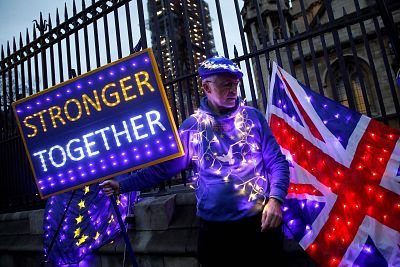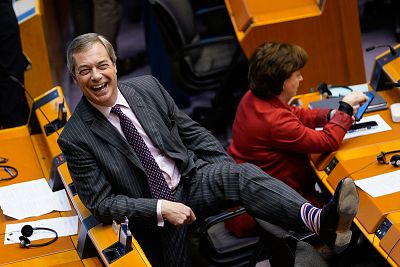"Our job as the government — my job — is to bring this country together and take us forward," Prime Minister Boris Johnson said.
LONDON — It happened — the United Kingdom has walked away from the world's largest political and economic club.After 47 years of membership — and more than three years of political uncertainty, rancor and division — the United Kingdom officially left the European Union on Friday.The Brexit divorce was made official at the stroke of 11 p.m. local time (6 p.m. ET), with the image of a countdown clock projected onto Prime Minister Boris Johnson's official residence, No. 10 Downing St.With a population of more than 513 million, the E.U. has its roots in the years after World War II, created partly from a desire to ensure no such conflict could ever happen again. It is one of a handful of institutions that have come to define the postwar consensus and even the West itself — but a pact that in recent years has been put under extreme strain.For the U.K., a powerful empire stretching across the world less than a century ago, Brexit is a historic milestone in its modern history, set to define its new alliances in a rapidly shifting geopolitical landscape. But even some supporters see it as a huge gamble.In a recorded speech, the prime minister sought to help heal a deeply divided nation."Our job as the government — my job — is to bring this country together and take us forward," said Johnson, the leader of the Conservative Party. The party's decadeslong internecine battle over Britain's membership in the E.U. precipitated the 2016 Brexit vote."This is the dawn of a new era in which we no longer accept that your life chances — your family's life chances — should depend on which part of the country you grow up in," he added, a likely reference to the Conservatives' recent success in wooing voters from the north of England who had traditionally voted for the opposition.
To celebrate the event, thousands of people descended on a pro-Brexit rally outside Parliament, an event awash with union flags, but also other banners denouncing the "traitors" who oppose Brexit."I think it's great that it's happening, finally, after so much dither and delay," said Luke Doherty, 21, a student at Cardiff University in Wales, who was one of those who braved a drizzly night in central London. "At last, we're going to get on with what people voted for in 2016."Chris Sergeant, 70, traveled down from Oxford to mark the occasion. "We're now free to do what we want," he said, wearing a knitted union flag sweater, hat and pin. "Anyone who isn't celebrating tonight, they've got to get over that."People traveled from all over the U.K., with northern English, Welsh and Scottish accents heard among the crowd. Shouts of "Rule Britannia" and "Come on, England!" punctuated the night air, as well as angry boos for the media and anti-Brexit politicians.Perhaps not wanting to gloat, the government opted for a modest light show and the release of a commemorative 50 pence coin, rather than an ostentatious fireworks display or a larger event.Steve Baker, a Conservative lawmaker, tweeted that he was "bearing in mind our need to unite this country when many people feel great sorrow about leaving the E.U." He said he was "encouraging magnanimity from Brexit supporters."But despite Johnson's and the government's conciliatory tone, the wounds of Brexit show little signs of healing.After all, the June 23, 2016, referendum was a close one, with 52 percent voting to leave the E.U. and 48 percent to remain. Recent polls suggest that opinion has since swung the other way, but only just.And, yet, this epochal moment will have almost zero immediate impact on Britons' daily lives.Friday marks more of a starting point than a destination with months, if not years, of complex and surely difficult negotiations to go. The milestone triggers an 11-month transition period in which the U.K. and the E.U. will attempt to thrash out their future trading relationship.Johnson says he wants a bespoke agreement that satisfies a string of promises that he sold to voters who elected him in December. Many in Europe, not to mention plenty of independent experts, say that given the lack of time, his goal is optimistic in the extreme.Much is still uncertain about how the project will turn out, but economists are near unanimous in forecasting the divorce will do some level of economic damage to the U.K. and its neighbors.Despite these warnings, polls suggest that most Brits who voted for Brexit still believe in it. Many did so because they felt too many decisions were taken in Brussels, the E.U.'s political heart. Others saw it as a way to curb immigration.On the other side of this culture war, Remainers are more likely to be younger people, college graduates and ethnic minorities living in cities, and inclined to support issues such as multiculturalism, environmentalism and feminism, according to polling.Brexiteers are more likely to be older, less well-educated people living in regional towns, who tend to oppose those causes. They herald this as a new era of "global Britain," but critics worry it will expose the U.K. as a medium-size nation competing in a superpower world.
It also means Britain will try to forge a closer relationship with President Donald Trump — a man who is widely disliked here.The president "has long supported the United Kingdom's sovereign decision to withdraw from the European Union," U.S. Ambassador Robert Johnson said in a statement Friday. "Now that the U.K. is back in control of its own trade policy, we look forward to achieving a broad free trade agreement that will increase prosperity and create jobs in both our countries."The move also raises serious questions for the E.U. itself.Aside from losing its second largest economy, the bloc — now depleted to 27 members — is struggling to respond to right-wing populism, climate change and growing competition between Washington and Beijing.At midnight, for the first time in 70 years, a country will leave the European Union," French President Emmanuel Macron said in an address to his nation Friday. "It is a historic alarm signal that must be heard in each of our countries."It also remains to be seen how Brexit will stress the bonds of the U.K. itself. In Scotland and Northern Ireland, where most people voted against leaving the E.U., support for independence from London appears to be on the rise.The Brexit process became so tumultuous that at times it looked like it might never happen.Political norms have been shattered on a seemingly weekly basis. Brexit has seen two prime ministers, David Cameron and Theresa May, both humiliated, while Johnson has engaged in levels of political brinkmanship that shocked allies and opponents alike.But Brexit was all but confirmed, however, when Johnson won resoundingly during a Dec. 12 election, and with it a mandate to drive through his Brexit plans.For the anti-Brexit campaigners, the dream is over. Despite their best efforts, there is now no turning back, short of the distant prospect of applying to rejoin someday.Aside from drowning their sorrows in pubs, there are also a number of europhile events dotted across the country, including the "Rally to rejoin the E.U." outside Parliament that 1,000 Facebook users say they will attend.Their mood was summed up by Guy Verhofstadt, a lawmaker and Brexit coordinator in the European Parliament."Churchill's aspirational words still hold true today more than ever," he tweeted, followed by a quote from Britain's wartime leader. "Men will be proud to say 'I am a European.' We hope to see a day when men of every country will think as much of being a European as of being from their native land."













